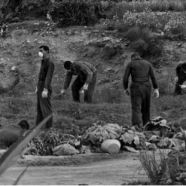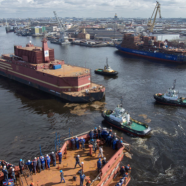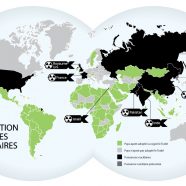From Franco to Trump: the Thermonuclear Saga
On January 17th, 1966 at 9:22 in the morning, a B52-Bomber from the US Air Force collided mid-air with an Air Tanker-KC135 during a supply drop at an altitude of 9450 meters. The cabins from the planes crashed into Palomares, a village 80 km from Carthagena in the province of Almería, Spain. Debris fell into the Mediterranean and blanketed the streets, hills, fields, and beaches. Amongst the debris, there were four thermonuclear bombs.
The Atomic cartel on the defensive
Press release and map on the occasion of the Nobel Peace Prize ceremony, Sunday December 10th, awarding Madam Setsuko Thurlow, survivor of the atomic bombing of Hiroshima and Madam Beatrice Fihn, Executive Director of ICAN (International Campaign to Abolish Nuclear Weapons).
At present, 127 States have adopted or signed the Treaty on the Prohibition of Nuclear Weapons. None of the nuclear-armed States took part in negotiations. Japan did not participate in the vote.
2017 : The Bastille Day is nuclear
July 14, 2017. (9h26 Paris time).
Unfortunately France and the United States of America have published a joint statement to name the Treaty on the Prohibition of Nuclear Weapons as a nuisance and a threat to World peace. (1)
The Treaty on the Prohibition of Nuclear Weapons was adopted on July 7, 2017 by 122 States with support of the United Nations. It was inspired by the Convention on the Prohibition of Chemical Weapons initiated by France. It completes the Treaty on the Non-Proliferation of Nuclear Weapons and the Nuclear-Test-Ban Treaty. The preamble mentions not only the catastrophic consequences of use of nuclear ammunition but also the risk of accidental triggering.
Soon Kim will pick up the MOX in his binoculars
Within a few days, unless an accident occurs, the Pacific Egret will enter the North Korean missile influence area. The Pacific Egret carries 8 tons of MOX, a nuclear fuel made in France containing 8 to 10% of plutonium mixed with enriched uranium. This civil bomb left the French port of Cherbourg on July 5, 2017.
After having sailed down the Atlantic Ocean, passed off South Africa, crossed the Indian Ocean and the Pacific Ocean, the MOX is expected to be unloaded in the small private port of the Japanese nuclear power plant in Takahama, facing North Korea.














